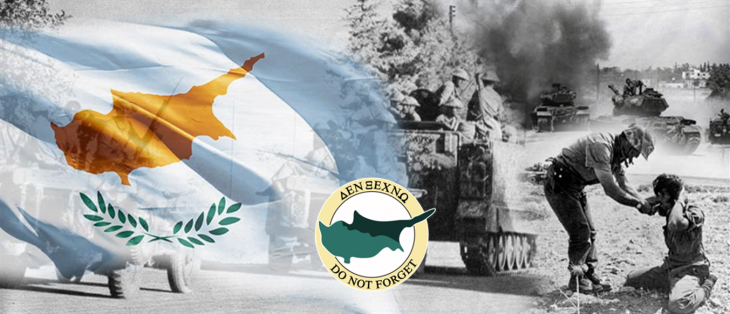CYPRUS MARKS 46 YEARS SINCE THE TURKISH INVASION

On July 20, 1974 at 5:30am, Turkish troops landed on the Republic of Cyprus’ coast five miles off Kyrenia. Since that day, nothing on the island has ever been the same.
Every year since, on the anniversary of the invasion, sirens have blared out over the Republic, recalling the moment Turkish troops invaded.
In 1974, approximately 40,000 Turkish troops under the command of Lieutenant Nurettin Ersin implemented their invasion plan, code-named ‘Attila’, illegally invading the island in violation of the UN Security Council Charter.
Turkey still illegally occupies 37 per cent of Cyprus’ territory.
Turkish troops invaded Cyprus on July 20, 1974, five days after the legal government of the late Archbishop Makarios III was toppled by a military coup, engineered by the military junta then ruling Greece. Two unproductive conferences in Geneva followed; the first between Britain, Greece and Turkey and the second with the additional attendance of Greek Cypriot and Turkish Cypriot representatives. Three weeks after the ceasefire of July 22, and despite the fact that talks were still being held and just as an agreement seemed about to be reached, the Turkish army mounted a second full-scale offensive. As a result, Turkey increased its hold to include the booming tourist resort of Famagusta in the east and the rich citrus-growing area of Morphou in the west.
All in all, almost 37% of the territory of the Republic of Cyprus came under Turkish military occupation. Nearly one-third of the population, some 200,000 Greek Cypriots, were forcibly uprooted from their homes and properties, thousands were killed during the hostilities, over 1,000 persons were listed as missing while thousands of Greek Cypriots and Maronites remained enclaved.
Numerous UN resolutions have demanded respect to the independence, unity and territorial integrity of Cyprus, the return of the displaced to their homes, and the withdrawal of foreign troops from the island, but all resolutions have been ignored by Turkey.
The National Federation of Cypriots in the UK last week, July 14th rallied a virtual All-Party Parliamentary Group ‘Cyprus@60: Opportunities, Challenges, Prospects for Reunification’. The Cypriot Foreign Minister Nikos Christodoulides briefed the APPG and members of the UK Cypriot community with the latest developments on the Cyprus issue, as well as other developments in the Eastern Mediterranean region.
He explained that Cyprus has always had a positive agenda and has never sought a “negative” foreign policy. He also noted that Cyprus strives to cooperate with its neighbouring countries on common principles and forge close partnerships across a wide range of fields.
He assured the Parliamentarians that Cyprus remains “strongly committed” to efforts to reunify the island and its people and that it remains ready to resume negotiations from where they have stopped.
The Federation President, Christos Karaolis, emphasised the tragedy of the fact that the Republic of Cyprus has “only been free and united for less than a quarter of its entire existence”. Mr Karaolis said, “what we want is simple, fair and rooted in international law – a free, re-united Cyprus that is based on the relevant United Nations Security Council Resolutions and High-Level Agreements.”
Karaolis also spoke of the close relationship that Britain and Cyprus share and said that “in a world where it [the UK] is not a member of the European Union, it can safely look towards the Republic of Cyprus as a reliable and predictable partner.” He concluded by paying tribute to all Presidents of the Republic of Cyprus since 1960 for “their immense contribution to Cyprus’ growing national story.” He also expressed gratitude towards all the British parliamentarians who have opposed the occupation of Cyprus and stood beside Cyprus during its first 60 years of independence.
Listen to the full broadcast on LGR this Monday evening from 7pm.
46 years on from the most tragic page in the Republic of Cyprus’ history, at 5:30am the war sirens rang around the island once more.
Article written by London Greek Radio

